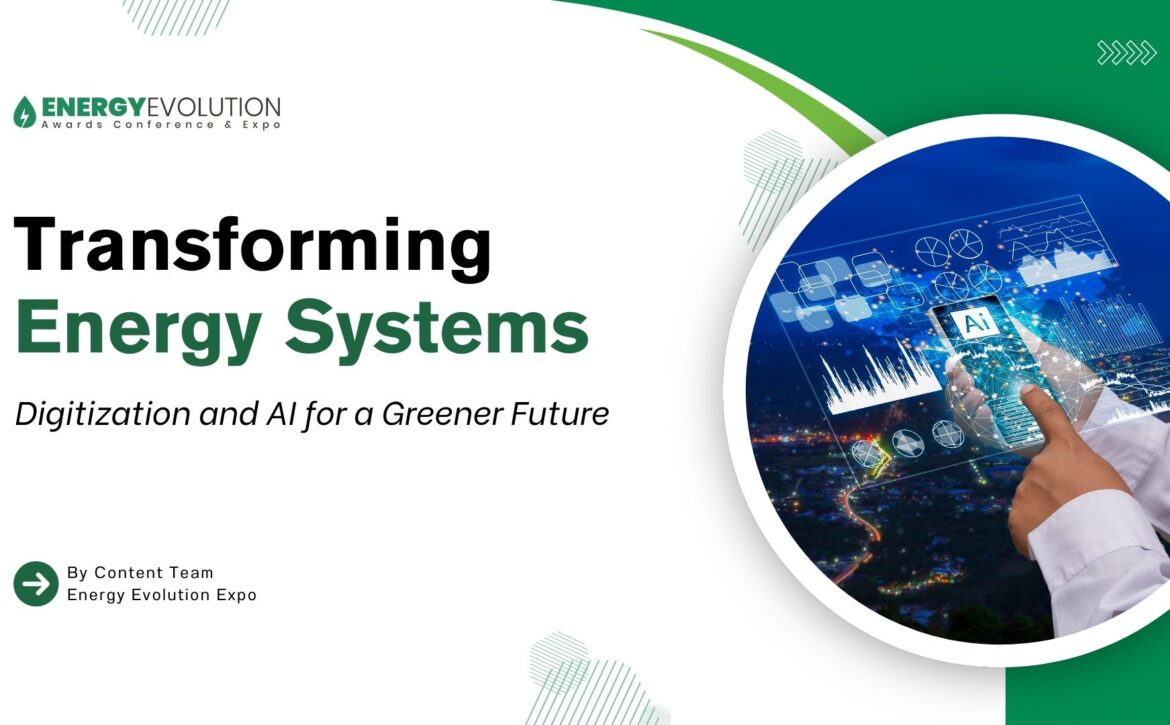Transforming Energy Systems: Digitalization and AI for a Greener Future
Imagine a world where energy flows seamlessly, waste is minimal, and systems predict and adapt to your needs. This is the transformative promise of digitalization and Artificial Intelligence (AI) in energy systems. At the forefront of innovation, the energy sector is harnessing these technologies to create smarter, more sustainable operations. From production to distribution and consumption, digitalization and AI are redefining efficiency, reliability, and sustainability in groundbreaking ways.
Digitalization in Energy Systems
Digitalization enables seamless communication between energy devices and systems, making operations more efficient and responsive. It integrates IoT devices, cloud platforms, and big data analytics to optimize energy generation, distribution, and consumption while minimizing waste.
Smart Grids
Enable real-time fault detection and ensure the seamless integration of renewable energy sources into the grid. By using advanced sensors and communication technologies, smart grids improve energy reliability and adaptability.
Digital Twins: The Future of Energy Optimization
Digital twins are virtual replicas of physical energy systems, empowering utilities to simulate operations and predict outcomes before implementation.
Application: Utilities can test renewable energy integration, system upgrades, or fault responses without risking real-world disruptions.
Benefit: This proactive approach minimizes risks, optimizes resource allocation, and enhances system reliability.
Smart Meters
Provide consumers with detailed insights into their energy consumption patterns, encouraging energy-saving behaviors and reducing wastage.
Benefit to Consumers: Greater control over energy use and reduced utility bills.
Benefit to Utilities: Improved demand forecasting and better grid management.
Example: Enel’s Digital Transformation
Enel, a global energy company, uses IoT and data analytics to monitor power plants and grids. Their digital solutions have reduced power disruption and operational costs by up to 25%, showcasing the transformative power of digitalization.
AI in Energy Systems
AI’s advanced analytics and decision-making capabilities make it a game-changer in energy management:
Energy Forecasting: AI actively predicts demand, ensuring optimal resource allocation.
Grid Stability: Real-time monitoring and automation prevent outages.
Predictive Maintenance: AI anticipates equipment failures, reducing downtime.
Case Study: Google DeepMind and Energy Efficiency
Google’s DeepMind
Challenge:
Google faced increasing energy costs and carbon emissions due to the high energy consumption of its data centers, especially for cooling systems.
Solution:
By collaborating with DeepMind, Google used AI algorithms to analyze historical energy data and predict energy demands. The AI optimized cooling systems by adjusting operational parameters in real time.
Impact:
Achieved a 40% reduction in energy used for cooling.
Improved overall energy efficiency by 15%.
Reduced operational costs and minimized carbon emissions, setting a benchmark for AI-driven energy optimization.
This case highlights AI’s potential to revolutionize energy management in various industries, demonstrating how advanced analytics can lead to substantial environmental and economic benefits.
Example 2: Tesla’s Virtual Power Plant (VPP)
Challenge:
South Australia faced challenges with grid instability and high electricity costs, particularly during peak demand periods.
Solution:
Tesla implemented a Virtual Power Plant (VPP) by equipping thousands of homes with solar panels and Powerwall batteries. These systems were connected via AI to create a decentralized energy network that stabilized the grid and distributed energy efficiently.
Impact:
Stabilized the grid during peak demand periods.
Reduced electricity costs for participants by up to 30%.
Demonstrated the scalability of decentralized renewable energy solutions.
Tesla’s VPP showcases how decentralized, AI-managed energy systems can provide affordable, sustainable, and reliable power, paving the way for future smart grids.
Example 3: BP’s AI Integration
British Petroleum (BP)
Challenge
British Petroleum (BP) aimed to minimize operational downtime and improve energy forecasting in oil and gas extraction.
Solution
BP employed AI for predictive maintenance, energy demand forecasting, and operational optimization. AI analyzed equipment performance data to predict failures and optimize drilling processes.
Impact:
Reduced downtime by 20% through predictive maintenance.
Enhanced operational efficiency, saving millions in extraction costs.
Improved resource allocation, reducing environmental impact.
BP’s use of AI demonstrates its versatility in both traditional and renewable energy sectors, highlighting its role in optimizing operations while addressing sustainability challenges.
Benefits of Digitalization and AI in Energy Systems
1. Enhanced Efficiency: AI-driven algorithms optimize energy production and minimize losses.
2. Sustainability: Seamless integration of renewable energy supports decarbonization.
3. Cost Savings: Predictive maintenance and optimized operations reduce operational expenses.
4. Reliability: AI enhances grid stability, minimizing blackouts and downtime.
Challenges and Solutions
Challenges:
Cybersecurity threats.
Data privacy concerns.
High implementation costs.
Solutions:
Blockchain Technology: Secures energy transactions and data integrity.
Government Incentives: Policies encouraging clean energy adoption.
Public-Private Partnerships: Facilitate funding and knowledge sharing for implementation.
Upcoming Energy Evolution Conference The Energy Evolution Expo, scheduled for March 13-14, 2025, in Madrid, will focus on the integration of AI and digital technologies into energy systems. With topics ranging from smart grids and AI in renewables to blockchain-enabled energy trading, the event will feature leading experts and innovators. Attendees can explore the latest advancements, including AI-driven predictive analytics, energy storage solutions, and sustainability frameworks. It’s an unmissable platform for stakeholders shaping the future of energy.
Conclusion
Digitalization and AI are reshaping energy systems, enabling smarter, greener, and more resilient operations. With impactful initiatives like Tesla’s VPP and Google DeepMind setting benchmarks, the path toward a sustainable energy future is clearer than ever.
Join global energy leaders and innovators at the Energy Evolution Expo in Madrid to discover how digitalization and AI are shaping the future of energy.



